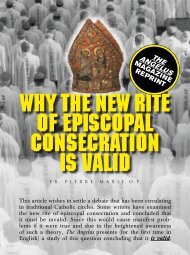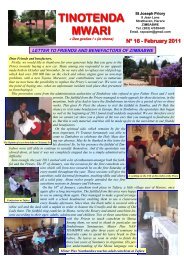Is Feeneyism Catholic? - Society of St. Pius X
Is Feeneyism Catholic? - Society of St. Pius X
Is Feeneyism Catholic? - Society of St. Pius X
You also want an ePaper? Increase the reach of your titles
YUMPU automatically turns print PDFs into web optimized ePapers that Google loves.
A NSWER TO OBJECTIONS 101<br />
above, salvation is at the end <strong>of</strong> spiritual life; now the reception <strong>of</strong><br />
the water <strong>of</strong> baptism is certainly not the end <strong>of</strong> the spiritual life!<br />
Does not the priest say to the newly baptized at the end <strong>of</strong> the<br />
ceremony <strong>of</strong> baptism: “Keep your baptism above reproach. Keep<br />
the commandments <strong>of</strong> God, so that when the Lord comes to His<br />
marriage feast, you may meet him in the halls <strong>of</strong> heaven with all<br />
His saints.” In other words, you are not yet arrived, you still have<br />
to walk on the path <strong>of</strong> the commandments <strong>of</strong> God. To let the<br />
people think that, with the water, their “justification has been<br />
turned into salvation” leads them to think that they have reached<br />
the end, they have nothing else to do: once saved, always saved.<br />
This is true <strong>of</strong> the entry into heaven— once there, always there—<br />
but it is not true <strong>of</strong> the grace <strong>of</strong> baptism: it can be lost.<br />
The Council <strong>of</strong> Trent affirms that these incarnational requirements<br />
are given to the soul in justification:<br />
For, although no one can be just, but he to whom the merits<br />
<strong>of</strong> the passion <strong>of</strong> our Lord Jesus Christ are communicated, yet is<br />
this done in the said justification <strong>of</strong> the impious when by the<br />
merit <strong>of</strong> the same holy passion, the charity <strong>of</strong> God is poured<br />
forth, by the Holy Spirit, in the hearts (Rom. 5:5) <strong>of</strong> those that<br />
are justified, and is inherent therein: whence, man, through<br />
Jesus Christ in whom he is ingrafted, receives, in the said justification,<br />
together with the remission <strong>of</strong> sins, all these (gifts) infused<br />
at once, faith, hope, charity. 147<br />
For these “Incarnational requirements” for justification itself,<br />
one needs the waters <strong>of</strong> baptism, re aut voto–in fact or at least in<br />
desire, as Trent teaches.<br />
Fr. Feeney wrote: “…the sinners, just and unjust,…” 148 There<br />
is no such thing as a just sinner! Such a statement manifests an<br />
erroneous understanding <strong>of</strong> justification!<br />
UNFULFILLED AND FULFILLED JUSTICE<br />
Fr. Feeney says: “Unfulfilled justice is the state <strong>of</strong> justification.<br />
149 Fulfilled justice is the state <strong>of</strong> salvation.” 150 That “unful-<br />
147 Sess. 6, Chap. 7, Dz. 800, TCT 564.<br />
148 Bread <strong>of</strong> Life, p.16.<br />
149 There is no such thing as a “state <strong>of</strong> justification.” Justification is defined by<br />
Trent as a passage, not a state!<br />
150 Bread <strong>of</strong> Life, p.118.











